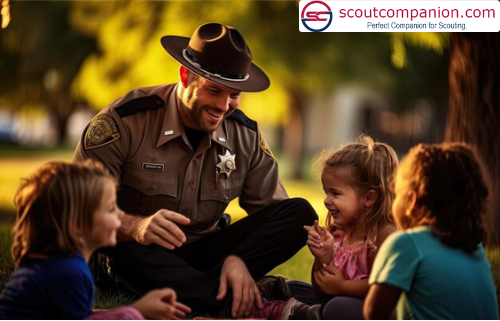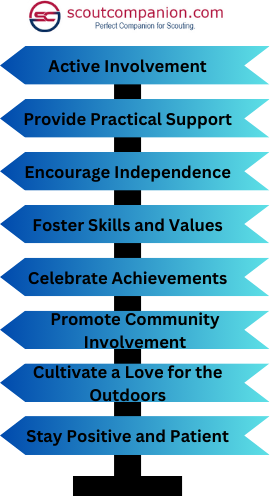Scouting is a global youth movement that focuses on the growth of young people to develop themselves into responsible and good citizens. At its core scouting teaches kids the importance of values such as respect, responsibility, and resilience. As a parent supporting their kid’s scouting journey is an opportunity to guide, nurture, and empower them along with understanding the objectives of scouting and aligning your support to your kids is a vital need. Let’s learn about the importance and need to parental support through this article.

Table of Contents
Introduction
One of the practical ways the parents can support their kids is by taking part in the scouting communities, or by simply cheering in the sidelines, or just by their presence in the scouting troop meetings. When parents actively engage in their kids’ scouting activity, it not only strengthens their bond with their kids but also models the commitment and enthusiasm that each scout needs. This Parents Guide to Supporting Scouts guide aims to help parents to understand how they can actively contribute to their kids’ scouting journey from attending scout meetings to leadership development. To learn more about the need of parental support ,you can visit Boy Scouts of America Official Site.
The Importance of Parental Support in Scouting

Parental support plays a vital role in the development of a kid’s scouting skills as it serves as the foundation where the young scouts build confidence and character along with adventurous skills. The emotional support can only be provided by the parents which makes the kids step out of their comfort zone and explore the adventurous world. The adventurous exploration starts from their first scouting trip
Parents serve as role models for their kids by passing their values and principles to them which is essential for scouting activities. When parents commit themselves in their kids’ scouting activities, the kids will also stay motivated and consistent by committing themselves. Along with scouting achievements, like merit badges and other trophies, parental support enhances learning experience and strengthens family connections which extends far beyond childhood with everlasting memories.
Need for Parents Guide to Supporting Scouts
The need for parental guide is because parents play a crucial role in shaping their child’s scouting journey. Scouting is more than an extracurricular activity. it is an opportunity for children to develop life skills, build confidence, and foster values like teamwork, leadership, and resilience. However, the journey can be challenging, requiring emotional support, encouragement, and active involvement from parents.
Many parents may not fully understand how they can contribute to their child’s success in scouting without overshadowing their independence. A parental guide provides clear, actionable advice on how to strike this balance. It helps parents understand the importance of their role, from attending meetings and events to fostering a growth mindset and encouraging leadership opportunities.
This kind of guides help parents to navigate these areas, ensuring their child gets the most out of scouting by stressing the value of being a positive role model, creating a sense of belonging, and celebrating achievements along with enriching, enjoyable, and transformative scouting experience for both child and parent.
How Parents can Support their Kids in Impactful Ways

The following are the 8 impactful ways how parents can support their kids in their scouting journey by enriching and making memorable:
- Active Involvement
- Provide Practical Support
- Encourage Independence
- Foster Skills and Values
- Celebrate Achievements
- Promote Community Involvement
- Cultivate a Love for the Outdoors
- Stay Positive and Patient
Active Involvement
Parents can make a significant impact on their children’s scouting journey by actively engaging in their scouting programs like attending troop meetings, events, and ceremonies to show you support and stay informed. Parents’ active participation will tell their children symbolically that they value their scouting participation. Your presence will build a strong connection with your child’s experience and foster their enthusiasm.
Parents can also act as volunteers by taking on leadership roles like committee member, event organizer, or assistant leader. This will not only motivate your own kids but also other parents to actively participate in their kids’ scouting programs. Through these kind of volunteerism roles parents can teach their kids in a more practical way.
Provide Practical Support
Practical support means ensuring whether your child is prepared and confident for their scouting activities. This includes the following supports:
- Helping them with their checklist for scout camp packing by providing right equipment for scouting such as camping gear, uniforms, or materials for badge projects
- Helping them to stay organized by guiding them to plan their schedules and prepare for events.
- Providing financial support for scout travel expenses or special training sessions so that the kids can fully participate.
- Offering encouragement and advice when they encounter challenges or group dynamics.
- Collaborating with other kids’ parents for supporting the scout troop by organizing fundraising events, or sharing resources.
When you ensure they have what they need, they can participate and learn in scouting without any additional stress by making the scouting experience smooth and enjoyable.
Encourage Independence
Scouting is designed to teach children self-reliance, and parents can play a crucial role by encouraging independence. Parents should let their kids take accountability for their responsibilities, such as packing for their scouting events and managing their events, setting personal goals within the program. Instead of stepping in and solving their problems, parents should let their kids find a way to sort their problems and face their challenges.
For example, if they face a challenge during a scouting project, ask open-ended questions to help them brainstorm ideas. This approach builds their problem-solving skills, confidence, and resilience, which are the key attributes that scouting aims to develop through their scouting programs and events.
Foster Skills and Values

Parents can reinforce the essential skills and values that scouting promotes, such as leadership, teamwork, and perseverance. Parents can encourage their kids to practice these qualities not only inside scouting but also in day-to-day life. Also teach them practical skills like time management, effective communication, and setting goals to help them shine in their activities and projects.
Along with skills, they also discuss the importance of values such as integrity, respect and responsibility by showing them how to apply these skills and values in real world scenarios.
Celebrate Achievements
Celebrating achievements is a wonderful approach to motivate and appreciate your child by acknowledging their efforts in scouting. The following actions can be considered achievements and celebrated:
- Earning a badge
- Complete a challenging project
- Contribute to community service event
- Completing a scouting course
- Finishing a scouting trip
Parents can also attend their kids’ award ceremonies, take pictures, or share their success with their friends and family members. By celebrating their achievements in these ways, will boost their confidence and also validates their hard work and effort. Celebrations don’t need to be elaborate. Even simple open heart-felt talks will also make your kids feel proud and valued.
Promote Community Involvement
Scouting highlights the importance of giving back, and parents can encourage their child to embrace community service. Parents can also join them in troop-led initiatives like cleaning parks, helping at food banks, or assisting neighbors in need. Parents should discuss the impact of these activities and how they contribute to their society.
Your active participation in community service teaches your child the significance of teamwork and empathy and the need to help others. Additionally, supporting troop projects and engaging with other families in the community helps strengthen bonds within the group, and also with the neighborhood, creating a more enriching and supportive scouting experience for everyone involved.
Cultivate a Love for the Outdoors

Scouting often revolves around outdoor activities, like team-building games, hiking, camping, and navigation. Parents can help nurture their child’s appreciation for nature. Plan family outings to parks, hiking trails, or camping trips to complement their scouting experiences. Teach them outdoor skills like setting up a camp tent, cooking on a campfire, or identifying plants and wildlife.
Encourage them to respect the environment by practicing sustainability and conservation for nature as these values align with the LNT(Leave No Trace) Principle of scouting. By fostering a love for the outdoors, you help your child develop a lifelong connection to nature, which is an integral part of scouting. These shared experiences also strengthen family bonds and create lasting and fun filled memories.
Stay Positive and Patient
The scouting journey will have its ups and downs, and a positive, patient approach from parents can make a big difference. Parents should encourage their children when they are facing challenges and focus on their efforts in their scouting journey instead of focusing just on the outcomes. If they feel overwhelmed or unmotivated, provide reassurance and remind them of their strengths and achievements.
Be patient during setbacks and help them see challenges as opportunities to learn and grow. Your unwavering support helps them stay resilient and motivated, ensuring they have a fulfilling and enjoyable scouting experience. Parents should acts as an emotional anchor where the children can share their thoughts, feelings and frustrations without getting the fear of judgement.
Tips for Parents to Support their kids’ Scouting Journey
Many parents may be unfamiliar with the structure, goals, and values of scouting. Tips provide valuable explanation on how scouting functions and what are the requirements needed from parents’ side to the scouting organization. These tips will also equip the parents with the necessary knowledge they need to know to support their kids’ scouting journey.
The following are some of the tips for parents on how to support their kids’ scouting journey:
- Be a role model of scouting values
- Encourage healthy risk-taking
- Engage in collaborative learning
- Promote a growth mindset
- Encourage reflection and gratitude
- Support their leadership development
- Encourage diversity in activities
- Foster a sense of belonging
1. Be a Role Model of Scouting Values
Scouting stresses values such as respect, integrity, and responsibility. Parents can support their child by modeling these values at home and in daily life. Demonstrate respect by listening actively to your child. When your child shares their ideas, give them full attention even though they look trivial. When you as a parent validate your child’s feelings they will validate others feelings which results in the development of empathy.
Teach them the importance of respecting different people who come from different communities, backgrounds, cultures, and opinions. Share your experiences and real-world examples or stories of how diversity enriches our lives and communities which aligns with the inclusive ethics of scouting.
Integrity is the most important character to be developed as it leads to trustworthiness which is essential for leadership. Discuss integrity with your kids by making them admit their mistakes instead of blaming others and taking accountability for the consequences of their actions. Taking ownership of tasks and their outcomes is a vital life skill. Parents can implant this by encouraging their child to contribute meaningfully at home and beyond.
2. Encourage Healthy Risk-Taking
Encouraging children to step out of their comfort zones is a fundamental way parents can support their scouting journey. Scouting offers way more opportunities to push personal boundaries by participating in outdoor survival camps, performing in front of a group, or taking leadership roles. Parents should make their kids understand that feeling nervous is a natural response to new challenges and reassure them that these feelings are normal.
While taking risks children need to face and solve challenges. These challenges may appear like big tasks to them. But breaking them into small manageable tasks will help them to solve it without feeling stressed or confused. Celebrate their courage to attempt something difficult, regardless of the outcome. This approach builds resilience and confidence, essential traits for success in scouting and life.
3. Engage in Collaborative Learning

Collaborative learning is a powerful way for parents to actively engage in their child’s scouting journey, turning it into an enriching family experience. By working together on skills and activities, parents can reinforce their child’s knowledge, deepen their understanding, and build stronger relationships.
For example, plan a family camping trip where your child can apply what they’ve learned, like setting up a tent or starting a campfire. Collaborative learning not only reinforces their knowledge but also creates shared memories and strengthens family bonds.
One of the best ways to learn is by teaching. Encourage your child to explain or demonstrate what they’ve learned in scouting to you or other family members.Create a scrapbook, video diary, or photo album to document the skills and activities you’ve practiced together. Not only does this serve as a cherished memory, but it also allows your child to look back and see their growth over time.
4. Promote a Growth Mindset

Promoting a growth mindset in children is one of the most valuable gifts parents can offer, especially during their scouting journey. A growth mindset believes that abilities and intelligence can be developed through dedication and hard work helps children approach challenges with resilience and curiosity. It shifts their focus from merely achieving results to valuing the process of learning and improving.
A growth mindset thrives on curiosity. Encourage your child to ask questions, explore new activities, and take on unfamiliar challenges in scouting. If they are hesitant about trying something new, remind them that every experience, whether successful or not, adds new knowledge and capabilities. This attitude fosters adaptability and a lifelong love of learning.
Teach your child that failure is not a reflection of their hard work but a stepping stone to improvement. This perspective helps children build resilience and makes them overcome with determination rather than discouragement. Help your child see feedback as a tool for improvement rather than criticism.
5. Encourage Reflection and Gratitude
Encouraging reflection and gratitude in your child’s scouting journey fosters self-awareness and emotional intelligence. Reflection allows children to process their experiences and recognize how they’ve grown. After each scouting activity or event, set aside time to ask open-ended questions to evaluate their learning.
For example:
“What skills did you practice today?”
“What was the most challenging part, and how did you handle it?”
“What is something you did today that made you proud?”
These questions help children identify their achievements, understand the value of perseverance, and recognize areas where they can improve.
Gratitude helps children develop a positive outlook and strengthens relationships within their scouting community. Parents should discuss the importance of appreciating the people who contribute to their experiences, such as troop leaders, fellow scouts, and volunteers through verbal gratitude and Thank-you notes.
6. Support Their Leadership Development
Supporting your child’s leadership development is one of the most valuable ways parents can contribute to their child’s scouting journey.Scouting presents a natural setting for your child to step into leadership roles. Encourage your child to volunteer for these roles, and reassure them that leadership is a skill that develops with practice
Have open conversations with your child about what makes a good leader. Discuss qualities like responsibility, integrity, patience, and empathy. Help them understand that leadership isn’t about being the loudest or most dominant person in the room; rather, it’s about guiding others with kindness and respect.
Leadership often involves making decisions under pressure and solving problems in real-time. Encourage your child to make decisions on their own, while providing support when needed. Giving your child the space to make decisions and solve problems fosters confidence and self-reliance. Leadership roles in scouting help build confidence and prepare children for future challenges.
7. Encourage Diversity in Activities

Scouting offers a wide range of activities, from outdoor adventures to community service and creative projects. Encourage your child to explore different aspects of scouting to broaden their interests and skill sets.
For instance, if they typically prefer arts and crafts, gently encourage them to participate in a group hike or camping trip, allowing them to connect with nature and build resilience.Help your child understand the value of trying a variety of activities.
Highlight the fact that every activity, regardless of how successful or enjoyable it may seem at first, offers valuable lessons. This mindset helps them appreciate the process rather than just focusing on the outcome.Encourage them to see challenges as opportunities for improvement, not as things to avoid.
Many scouting activities like completing a project together, participating in a competition, or organizing a troop event, involve working with others, which is an excellent opportunity for your child to develop teamwork skills. Encourage your child to engage in these team-oriented experiences, where they can build lasting friendships and develop important interpersonal skills.
8. Foster a Sense of Belonging

Fostering a sense of belonging within the scouting community is crucial to a child’s overall experience in scouting. Parents can help their child feel connected by fostering a sense of belonging within the troop. Encourage your child to participate in group activities, build friendships, and support their peers.
Additionally, attend troop events to show your support and get to know other families. Your active involvement in troop events demonstrates to your child that scouting is important to you. Attend as many troop meetings, outings, and special events as possible, and show your enthusiasm for what your child is participating in.
Parents can also foster a sense of belonging by creating connections within the scouting community that extend beyond troop activities. Arrange play dates or family events where families can interact in a non-scouting environment, strengthening the relationships among scouts and their families. These informal settings help build lasting friendships and provide a more personal connection between families.
Conclusion
In conclusion, supporting your child’s journey in scouting is an enriching experience for both you and your child. Scouting is not just about badges or achievements; it’s about helping your child grow into a confident, independent, and skilled individual. As a parent, your involvement plays a significant role in this development.Encouraging a positive attitude and a growth mindset is crucial. Scouting can be challenging at times, and your child may face setbacks. Supporting your child’s scouting journey is about being involved, encouraging them to take on challenges, and helping them develop essential life skills. Your guidance, love, and encouragement will help your child grow into a confident, resilient individual ready to take on the world.



